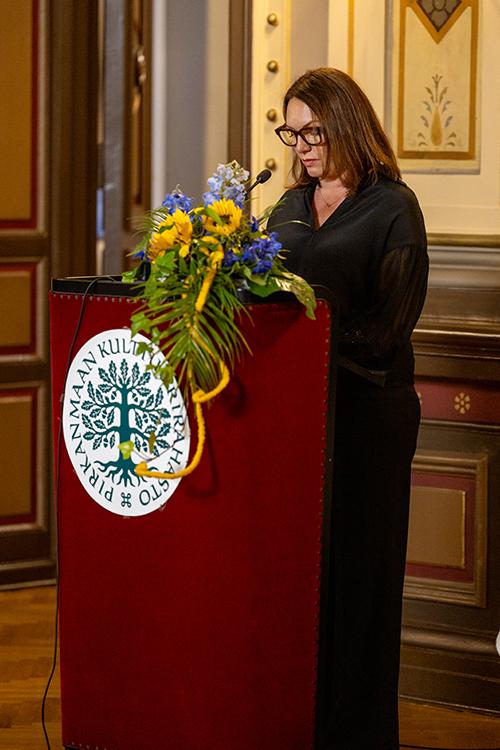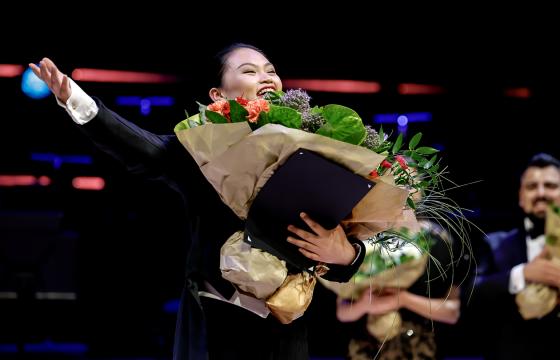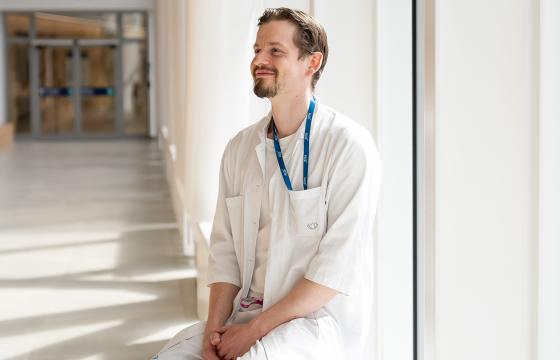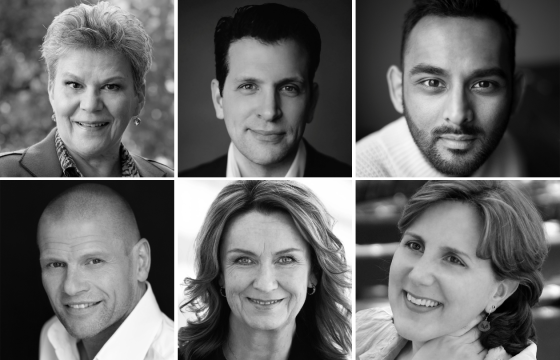
The Keynote Speech by journalist Myroslava Gongadze
You can watch the speech from video below or read the text.
Watch all the speeches of the event
Last year at this time I was standing in a different spot in another part of the world. I was in the middle of a horrendous scene, at a mass grave near the small Eastern Ukrainian town of Izium. I was witnessing the uncovering of bodies of Ukrainians killed by Russian forces. Retreating, in the face of the Ukrainian counteroffensive they left behind chilling signs of the horrors Ukrainians suffered during almost six months of occupation. Locals told me stories of people who went missing and were tortured. Some people, including children, were killed just for speaking Ukrainian or wearing Ukrainian symbols. The pine tree forest, where I was standing, held evidence of Russian war crimes.
Russia is committing genocide in Ukraine. I had to be there to witness and tell this story to the world.
Now many of us know the names of Ukrainian towns - Bucha, Irpin, and Mariupol. According to the last reports from the beginning of the large-scale armed attack by Russia, 13 million people have been displaced, nearly 10 thousand civilians were killed and 17 thousand were injured in Ukraine. Seeing skulls with bullet holes, bodies with hands tied behind the back, mutilated, with visible signs of torture, the smell of death and despair in that forest brought traumatic personal memories and made me fully realize what the Ukrainian nation went through for hundreds of years of occupation under the Russian/Soviet/Kremlin regime.
When I was growing up in the Soviet Union I did not understand any of this. My small picture-perfect western Ukrainian town of Barazhany held a lot of dark history of the 20th century. But in 1972, the year I was born, it was all hidden, and my neighbors were preparing to step into the communist era.
In school, I learned about Stalin's successful industrialization policy, the Great Patriotic War, and poor people in America suffering from capitalism. I did not learn anything about my heritage or the history of Ukraine. The use of words like independent Ukraine, blue and yellow national flag, or God was a punishable offense.
I grew up with the realization that not everything is written in the paper or said on TV is true. From a young age, I learned – you can’t repeat anything your parents say at the dinner table or tell anyone what you heard on that foreign radio station that your father listened to under the cover of the night.
I was confused, what is truth – the things that they tell you in school or what your parents are teaching you?
So all my adolescence I was on the journey to learn about my own Ukrainian history.
I have learned about the short period of Ukraine’s independence in 1918, recognized by Europeans after WW1 but crushed by the Soviet regime a few years later.
I have learned about Stalin's policy to crush Ukraine’s identity and the man-made famine- Holodomor, which in the early 1930s, by different estimates took the lives of more than 7 million Ukrainians.
I learned about the Ukrainian resistance movement after WW2.
I learned about Gulag and Ukrainian leadership – murdered by the Stalin regime and later Ukrainian descendants of the 60s and 70s sent to camps in Siberia.
My world as I knew it, crashed on me.
I was fed up with constant lies, I needed to know and be able to tell the truth.
This desire led me to journalism, which I have been doing for more than 25 years.
The collapse of the Soviet Union in 1991 opened a door for freedom for me and my friends. It was an exciting time - the beginning of my adult life and the beginning of the independence of my country, a special time for both of us. I was studying law, but curiosity and constant search for a better understanding of life around me brought me to journalism. It was the same for another young student from the English language department - George Gongadze, who wanted to tell the story of his native country, tarred by war Georgia.
I was fed up with constant lies, I needed to know and be able to tell the truth.
We started working together.
We were building a new democracy and establishing an independent media, that did not exist in Ukraine - we saw the bright future ahead. In these initial years of Ukraine’s independence, we were free to cover any story.
While I ventured to do international news – George was deeply involved with covering the internal politics and growing corruption. He produced and anchored a weekly TV show about current affairs.
At one of the shows, he told the story about the so-called Kuchma clan - the ring of oligarchs around the president. The presidential administration noticed George was warned by the management of the company, they started to censor his show.
We started getting “recommendations” from the management - what stories to cover, and what to stay away from.
We felt the times were changing and the window of freedom was closing on us.
The president and his circle took a tighter grip on the media. Journalists, who would ask uncomfortable questions would lose their jobs: one would “commit suicide”, and another would die from the television explosion in his apartment. All of these would be called accidents and none of them would be investigated.
We were expecting our children when George told me he had to quit the job. But he could not stop digging for the truth, investigating illegal foreign bank accounts of the top country’s officials close to the president, election fraud, infiltration by Russian agents, and corrupt deals.
We know now that feeding corruption and strengthening oligarchs in Ukraine to keep the country's dependency on Russian money and energy was Russia’s strategy for keeping Ukraine in its sphere.
In 2000 the circumstances were dire for free journalism in Ukraine, so my husband decided to create his own newspaper. It would be an internet publication, with no printing costs. Creating an internet news website, which he would call Ukrainska Pravda, or “Ukrainian Truth,” would become the only way he and some other brave reporters could do their jobs.
At a time when not even one percent of the country’s population had internet access, he thought this was the only way to stay independent and relevant and to speak to the world. What he did not foresee, was how seriously the people in power would take this as a threat and what kind of danger he was putting himself in.
After a month of being under surveillance, on September 16, 23 years ago, my husband simply did not come home.
Two months later, in a local morgue, I saw what was left of him. He was killed by the government police because the president wanted to silence him.
In the days after his disappearance I was left in total shock and despair. I had two young kids on my hands, I was afraid to go to a home that I knew was under surveillance, and I was warned not to talk on the phone. I felt lost, confused, helpless, and angry.
"After a month of being under surveillance, on September 16, 23 years ago, my husband simply did not come home. Two months later, in a local morgue, I saw what was left of him. He was killed by the government police because the president wanted to silence him."
And then I had to make a decision, to keep quiet and accept the loss, or speak up and fight for justice but possibly put my own life at risk.
I chose the second.
I got the strength to go public.
I used my legal knowledge to demand the investigation and challenge it in court. I reached out to friends and coworkers in the media asking them to tell the story, friends in civil society to organize events, and some public figures I knew, to speak out for the case.
People would tell me that I have zero chance to find out what happened to George or get any justice. But I promised myself to do everything in my control to push the investigation forward. I promised myself and the public that this crime would not go unpunished.
It had an effect, the Ukrainian public was moved, and the story about George started dominating the news circles in Ukraine and started to be picked up by foreign media.
But after a month of fruitless struggle, I was forced to leave. The US took me and my two kids in, as refugees.
I arrived in the United States with no money, two suitcases, and no English. I was determined to keep working as a reporter because I saw it as my mission.
And I have never given up trying to fight for justice. My pursuit of justice and truth prompted me to raise my voice against violence toward journalists, shaped my commitment to the protection of journalists, and cemented my desire to see Ukraine as an independent, just, and strong society.
While I was successful in some of my pursuits, I failed at others. I was able to get only partial justice. All the perpetrators of the crime served prison time and the general who organized the kidnapping and murder was sent to life in prison. It took me over 20 years to see the final verdict in this case. But the instigators of the crime were never brought to justice.
My determination inspired people to find their voices in pursuit of a more just society and paved the way for two subsequent revolutions in Ukraine.
…
Seeing Ukraine's progress and Ukrainian aspiration toward joining the European Union and NATO, in February of 2022 the Kremlin decided to crush Ukrainian spirit and resistance by waging a full-scale war. By bombarding schools and cultural institutions, kidnapping Ukrainian kids, and destroying civilian infrastructure, Russians are trying to kill Ukrainian identity, as they have done so many times in history.
I can't simply watch it from afar, I had to go there to tell the story of Ukraine's final battle for independence, truth, and justice. I am proud of my fellow reporters who are risking their lives in Ukraine, to show you the face of Russian aggression and the courage and determination of Ukrainians. Sadly, at least 17 of my colleagues died while doing their job covering the Russian war in Ukraine. One of the first casualties of the war was my fellow classmate from the Nieman Fellowship at Harvard University, Brent Renaud. He was shot while filming the evacuation from Irpin at the beginning of the war.
It is difficult to cover the war, especially when you have to witness the suffering of your countrymen. You have to stay objective, put your emotions aside, and be vigilant about your biases. Remembering the principle of ethical journalism I learned at the beginning of my life in the US when I came to work at RFERL (Radio Free Europe / Radio Liberty) helps. It says:
“We do not regard balance as meaning neutrality regarding the truth. When one side in a debate misrepresents the facts, ethical journalism requires pointing out falsehoods and stating what is factually correct.”
In Ukraine, Russia did not merely attack Ukraine, it attacked the West and the values it represents - freedom, truth, morality, and human dignity.
Today democracy, the best-invented form of governance, is under attack and is at risk without critical thinking, and fact-based decision making which is impossible without responsible media, reporters, and free speech. Those reporters who are going after the story, pointing out what is right, and searching for the truth are the heroes of our time.
By protecting and supporting reporters, we as a society are protecting our freedom.
By defending democracies under attack, like Ukraine, we are defending our democracy.
To make this world more just, you have to make your decisions based on facts, knowledge, and the inclusion of different opinions and always search for the truth.
Timothy Snyder, in one of my favorite books “The Road to Unfreedom,” wrote - “Final truth in this world is unattainable, but its pursuit leads the individual away from unfreedom”.
We all need to do a better job of pursuing the best attainable truth possible, and I see my and my colleague's job as the constant pursuit of that sometimes unattainable truth, in service for others. Thank you.
The keynote speech was delivered by the American Ukrainian journalist Myroslava Gongadze, at the first Tampere Freedom of Speech Event on September 27, 2023. The excerpt is published online by the Finnish Cultural Foundation with permission from the author.



